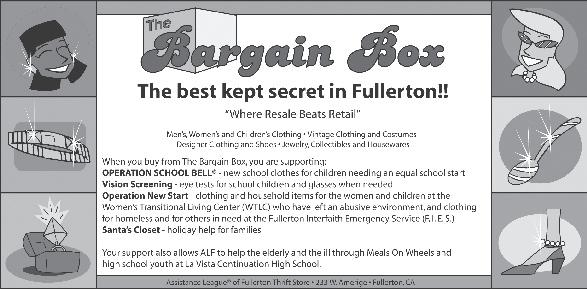
4 minute read
Feature—Eclectic tastes savor
Eclectic tastes savor indie music stores
BY KARI HAMANAKA
Advertisement
For the Daily Titan
When Radiation Records storeowner Nat Hall talks about the “network,” he is not referring to a businessperson’s Rolodex of important names and phone numbers. He is talking about something far more obscure, which is the lifeblood of many independently operated stores throughout Orange County.
“The network can be anything: underground labels, underground distribution, underground pressings—everything the corporations don’t even know exist,” Hall said as he placed stickers on the piles of new inventory stacked atop a yellow counter.
For Hall, his Anaheim record store stemmed from his interest in record collecting and love for music. Hall is in various bands, runs a mail order catalog and label under the name Puke ‘n Vomit and prints shirts for local bands.
So, as he put it, opening a record store that housed local, national and imported punk music just made sense.
The devotion of those who work at or own small record stores is what separates large music retailers from smaller shops. Something as specialized as how a store’s employees categorize music can be the telling mark of a specialty record store.
Walking into the La Habra Borders Books and Music, customers will fi nd the music of Agent Orange and Bikini Kill mixed with Britney Spears and Jessica Simpson under the “pop rock” genre.
To some, this fi ling system is of little signifi cance.
However, walk into Bionic Records in Fullerton and an Agent Orange album is under the “punk” section, Bikini Kill is in the “indie” section and the music of Spears and Simpson is nowhere in sight.
“Top 40 stuff like Britney Spears and Ashlee Simpson doesn’t sell [at Bionic]. We try to specialize in music that’s not carried at Tower or Sam Goody,” Bionic night manager Shane Oakley said.
Bionic, like Radiation Records, offers music fans an alternative source for buying vinyl or the works of local bands that a larger store may not carry for fear the album will not sell.
“They always have everything that I’m looking for here. There’s just something good about supporting your local indie store,” Bionic customer Paul Betancourt said.
While some argue that small stores offer cheaper prices, chain stores are becoming competitive. For example, Borders sells Rancid’s “…And Out Come the Wolves” for $11.99 while Bionic sells the album for $12.99.
“Loyal music fans will still shop here. Our biggest fear is people not being interested in the music anymore,” Oakley said.
Jeff Hale, of Greene Records shares Oakley’s optimism; Greene will celebrate its 10-year anniver
LAUREN HARGROVE/Daily Titan
Rob M. of Fullerton searches through Bionic Records’ bins of CDs in search of just the right one.


sary in June.
Adding to the eclectic feel of Greene, its staff is made up of people who are in bands themselves.
Hale, who plays the guitar for Kelly Osbourne, said being in a decent band is part of what it takes to work at Greene. However, like his counterparts at other small record stores, a love for music rather than money is what it takes to work at such shops.
“The money’s going back into the music,” Hale said. “You don’t open an indie store to make money. I’d defi nitely rather shop at a small business just because I know where the money’s coming from.”
“The difference between [indie stores] and the chains is that they do it for the love of it. Everyone tries to make money, but it’s a question of to what extent you’ll do it for,” said Toole, who works for Machine, a goth-industrial club in Huntington Beach.
“When you’re content with store sales, you lose touch with the scene so you’re not keeping up with the new bands. You’ve got to know what’s going on with the kids. You don’t just stop selling stuff just because a trend stops,” said Hall, as he helped a customer with questions about a silver-plated, bullet belt.
As fanzines and fl iers advertising local bands and shows are to the left of the doorway, looking around Radiation, the store’s ever

expanding inventory is already growing out of the space Hall moved into a little over a year ago.
Bondage pants hang from the walls. A stack of posters leans against the counter. Some might call the store cluttered; it does not have the fancy display bins or signs behind plastic cases that can be found in larger music stores.
“The corporate world is taking over,” Hall said, as he leaned back on a stool, “but as long as those people [in the network] continue to distribute, the network will continue; it will never stop. It’s the independent store’s job to buy those records so that the network will survive.”








